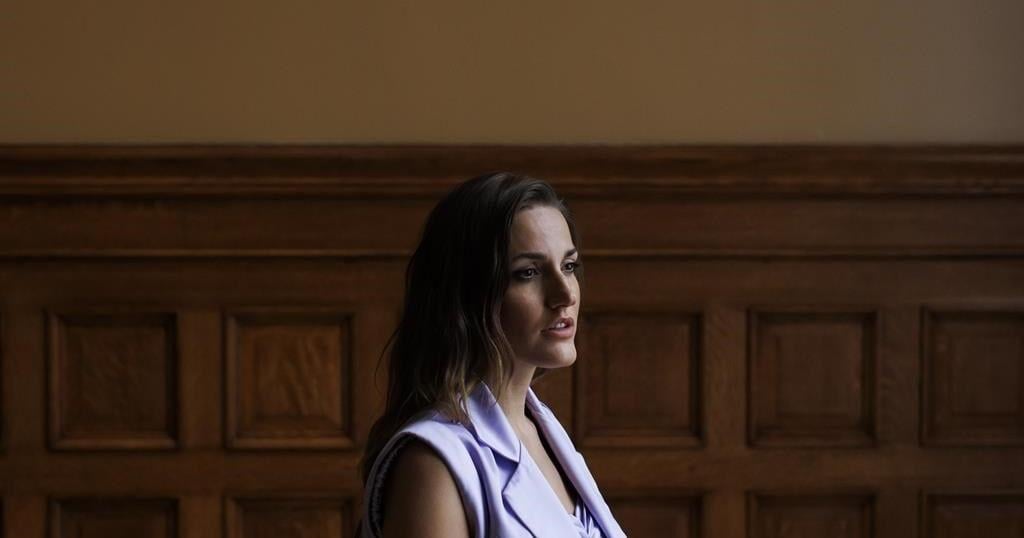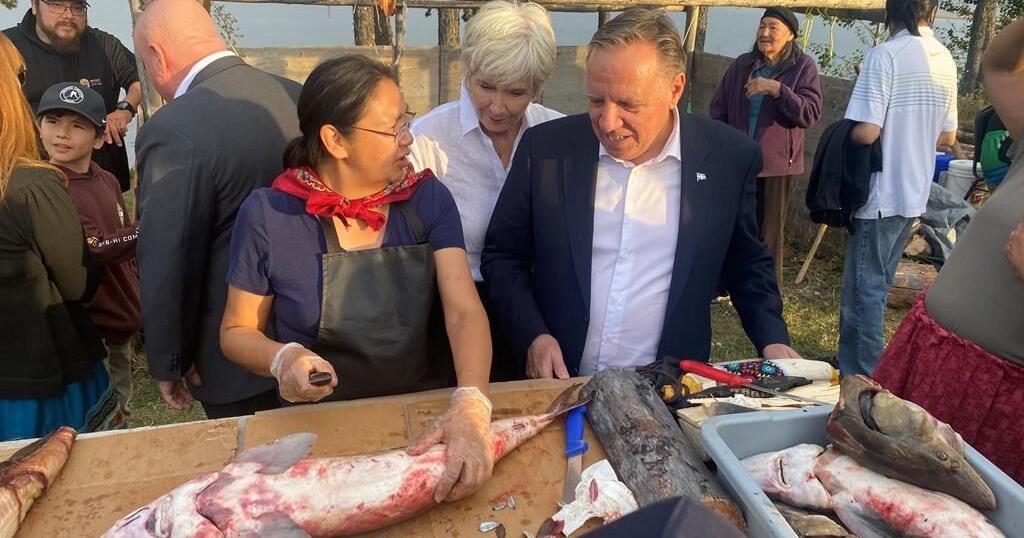OTTAWA – A witness who stormed out of a parliamentary committee meeting in tears Wednesday is demanding an apology from a Liberal MP who put a halt to a planned discussion about violence against women in favour of a debate about abortion rights.
Cait Alexander was on Parliament Hill to provide testimony at a rare summer hearing of the House of Commons status of women committee when she says Liberal MP Anita Vandenbeld re-victimized her as a survivor of domestic violence.
“I am completely flabbergasted,” Alexander said in an interview after the meeting Wednesday.
“This is exactly what it felt like these last few years, where I’m literally showing my bludgeoned, bleeding, bruised body and the people who have authority and power in this country are saying, ‘Well, we care about you.’ But then they silence you.”
Vandenbeld, who serves as parliamentary secretary to the Minister of International Development, did not immediately respond to a request for comment.
Alexander was one of two witnesses who stormed out of the meeting organized so MPs could hear from advocates for domestic violence victims and a deputy chief of the Peel Regional Police.
The meeting was scheduled after the killing of Breanna Broadfoot, 17, in London, Ont., who police say was a victim of intimate partner violence.
Conservative Leader Pierre Poilievre said last week that the suspect had previously been arrested but was released before the fatal attack, and criticized the Liberal government’s bail policies.
Though witnesses at the committee set out to similarly argue that the current justice and bail system is failing victims, the session quickly derailed into a mess of political bickering.
During her opening statement, Alexander, who heads up the advocacy group End Violence Everywhere, shared her personal story as her family watched from the public benches behind her.
“I’m supposed to be dead,” she told the committee, showing MPs graphic photos of the abuse she suffered at the hands of her ex-boyfriend three years ago.
“If you haven’t met a survivor and a victim’s family, well, now you have.”
Before long, Alexander’s family members we berating MPs for a partisan display that descended into procedural chaos. Her mother told Vandenbeld that she was “disappointed,” and the whole thing amounted to further abuse of her daughter.
It began when Vandenbeld was given the floor to ask questions of the witnesses.
She gave a short statement about how much she cared about survivors’ stories, and outlined some of the actions the federal government has taken to address violence against women. Then she chided Conservatives for politicizing the issue by calling the meeting during the summer with little notice, which left other parties unable to prepare or recommend other witnesses.
“We do not use victims and survivors of trauma to try and score political points in this committee,” she pronounced.
“I think it’s cruel to have people relive the trauma that they’ve endured just to be able to have a meeting that, if it’s not agreed to, then there’s all kinds of social media that Liberals or others don’t care about this issue, which, as we all know, we do very deeply.”
Instead of pivoting back to the topic at hand, Vandenbeld went on to call for a debate on a motion related to abortion rights — an issue Liberals have tried to pin the Conservatives down on for months.
“This is the problem. Did she listen to anything that was said this morning?” said another witness, Megan Walker, who lives in London and advocates to end male violence against women.
After that, the meeting dissolved into a lengthy back-and-forth between MPs, as multiple points of order were brought to the chair.
NDP MP Leah Gazan confronted the Conservative chair of the committee for not allowing her to suggest witnesses for the meeting.
“I’m disgusted,” she said. “I’m representing Ground Zero for murdered and missing Indigenous women and girls.”
Not long after that, Alexander stormed out of the room in tears. Walker turned her back on the committee and followed.
Conservative MP Michelle Ferreri lambasted Vandenbeld for derailing the meeting, and said the victims came to testify in order to bring about “legitimate change.”
She apologized to Alexander’s mother, who stood behind the witness table.
“‘Sorry’ isn’t good enough — we’ve heard ‘sorry,'” Alexander’s mother told the committee.
The meeting adjourned shortly thereafter.
Alexander said afterward the entire ordeal was retraumatizing and that the committee’s actions are “exactly the type of behaviour that has allowed my abuser to go free.”
Alexander flew to Ottawa from Los Angeles to testify, and stressed she didn’t make the trip for partisan reasons. She saw it as an opportunity to highlight her story and those of countless other women who have had similar experiences, she said.
While abortion is a “serious issue” deserving of attention, she described the antics of the committee, and Vandenbeld, as “abusive,” and accused the Liberal of trying to use her trauma for political gain.
“It’s so utterly disrespectful, inhumane and honestly just unkind to not allow us to continue a healthy conversation on what was supposed to be discussed, and the audacity to do something like that,” she said.
Ferreri said in a statement the Liberals effectively silenced the victims.
“It is disgusting that this so-called feminist Liberal government today completely shut down a committee study into violence against women,” Ferreri said.
“The Liberals pulled this heartless stunt to cover for the prime minister whose reckless policies have unleashed a crime wave across Canada that disproportionately affects women and vulnerable groups.”
Walker said she hasn’t had an experience like the one she endured on Parliament Hill Wednesday in 25 years of advocacy.
“While they silenced us in that meeting, they will not silence us from moving forward in our valuable work to end male violence against women.”
This report by The Canadian Press was first published July 31, 2024.























